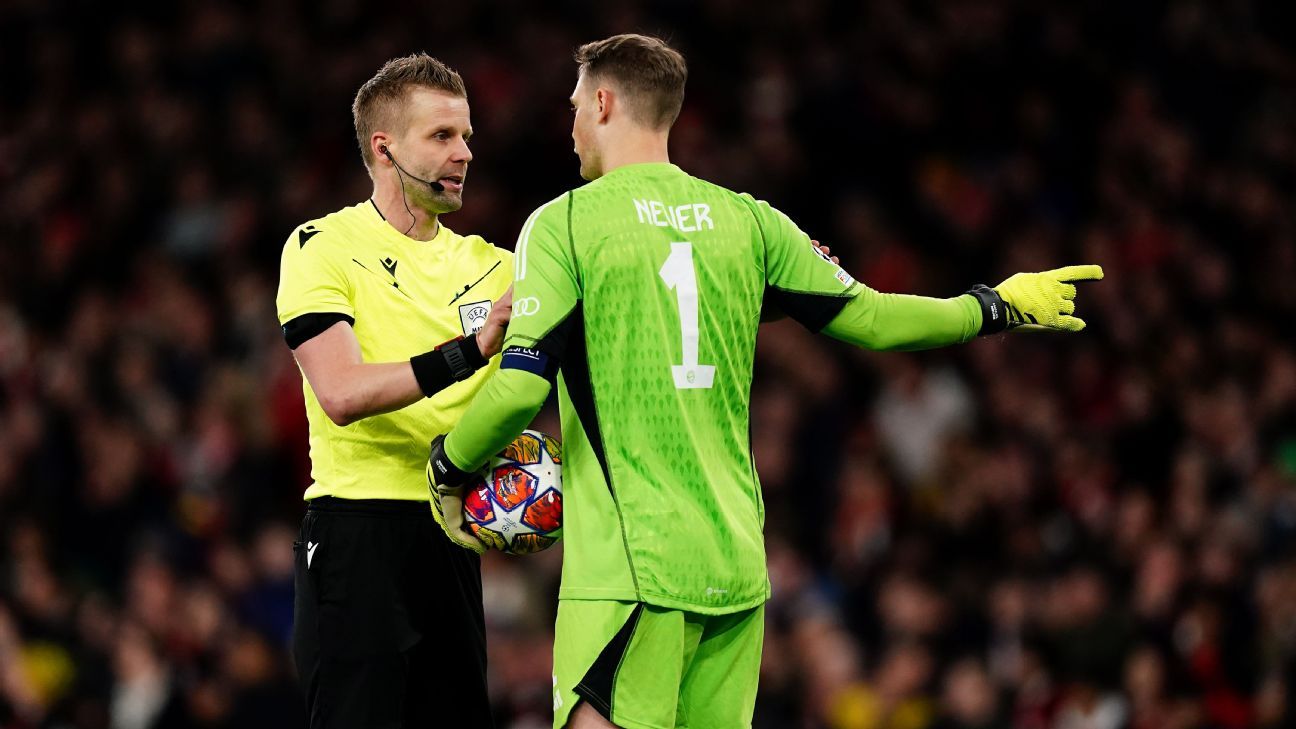IFAB trials corners, throw-ins for GK time-wasting
Written by I Dig Sports
The protocol behind a trial to limit the time goalkeepers hold onto the ball and run down the clock has been outlined by football's lawmakers, the International Football Association Board (IFAB).
It was announced last month that leagues would be invited to test two different methods of changing possession if the ball is held onto for too long, giving either a corner or a throw-in to the opposition.
- Stream on ESPN+: LaLiga, Bundesliga, more (U.S.)
Trials will be held throughout the 2024-25 season and appraised at the IFAB meetings at the end of 2025. If successful it's possible, but not certain, that the law could change across all competitions for the 2026-27 season.
The law currently forbids goalkeepers from holding onto the ball for longer than six seconds, with the punishment an indirect free kick from where the goalkeeper was stood.
The IFAB explained that referees have become reluctant to enforce the six-second law because a free kick is "too great an advantage, as the chance of scoring is high, whereas they had no possibility of scoring when the offence occurred, as they did not have possession of the ball."
It adds that managing a free kick so close to goal is "often extremely difficult, especially if it is to be taken from 9.15 m from the goal or closer, when the defenders have to be on the goal line between the goalposts."
However, the IFAB firmly believes that "a goalkeeper holding the ball for too long is an unfair tactic because the opposing team has no possibility to regain possession, as the goalkeeper cannot be challenged when in control of the ball."
Studies showed that it takes a goalkeeper less than six seconds to release the ball on a quicker counter attack, six to eight seconds when the goalkeeper attempts to release the ball but is unable to do so for a variety of legitimate reasons and 20 seconds or more when the goalkeeper decides to waste time, often unnecessarily falling to the ground and staying there before slowly standing up.
The IFAB's football and technical advisory panels discussed a number of options when it met towards the end of last year, and in March approved a trial to increase the time to eight seconds with specific protocol for enforcing it. It believes that systematic enforcement coupled with a restart that results in the goalkeeper (and their team) losing possession without giving the opposing team too big a benefit, could be effective in eliminating this offence or reducing its frequency.
It added that "the idea being that this will not penalise those goalkeepers who genuinely want to release the ball into play in a timely manner but, through no fault of their own, are unable to do so."
The trial can only take place in competitions which do not involve teams from the top two domestic levels or senior 'A' international teams -- so it won't be seen in the Premier League, FA Cup or Carabao Cup. However, it could be used in lower level competitions, such as the Football League trophy which mainly features clubs from League One and League Two.
Competitions taking part in the trial can only test one of the restarts for all matches -- either a corner kick or a throw-in to be taken in line with the penalty mark.
The following procedure will apply:
- The referee will start counting the eight seconds when the goalkeeper has clear control of the ball with the hand(s)
- The referee will use a raised hand to clearly show the countdown from five seconds to zero (as per the four-second count in futsal and beach soccer)
- The corner kick/throw-in resulting from an offence will be taken from the side of the field of play closest to where the goalkeeper was positioned when penalised
- The goalkeeper will be warned for the first offence and cautioned for any subsequent offence(s) It could see a situation whereby supporters engage with the countdown once the referee has raised him arm.















 Phone: (800) 737. 6040
Phone: (800) 737. 6040 Fax: (800) 825 5558
Fax: (800) 825 5558 Website:
Website:  Email:
Email: 






